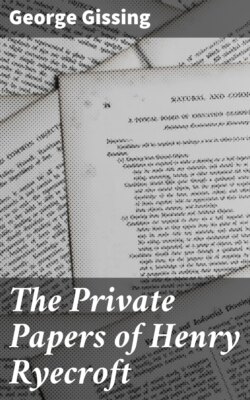Читать книгу The Private Papers of Henry Ryecroft - George Gissing - Страница 6
На сайте Литреса книга снята с продажи.
II.
ОглавлениеTable of Contents
The exquisite quiet of this room! I have been sitting in utter idleness, watching the sky, viewing the shape of golden sunlight upon the carpet, which changes as the minutes pass, letting my eye wander from one framed print to another, and along the ranks of my beloved books. Within the house nothing stirs. In the garden I can hear singing of birds, I can hear the rustle of their wings. And thus, if it please me, I may sit all day long, and into the profounder quiet of the night.
My house is perfect. By great good fortune I have found a housekeeper no less to my mind, a low-voiced, light-footed woman of discreet age, strong and deft enough to render me all the service I require, and not afraid of solitude. She rises very early. By my breakfast-time there remains little to be done under the roof save dressing of meals. Very rarely do I hear even a clink of crockery; never the closing of a door or window. Oh, blessed silence!
There is not the remotest possibility of any one’s calling upon me, and that I should call upon any one else is a thing undreamt of. I owe a letter to a friend; perhaps I shall write it before bedtime; perhaps I shall leave it till to-morrow morning. A letter of friendship should never be written save when the spirit prompts. I have not yet looked at the newspaper. Generally I leave it till I come back tired from my walk; it amuses me then to see what the noisy world is doing, what new self-torments men have discovered, what new forms of vain toil, what new occasions of peril and of strife. I grudge to give the first freshness of the morning mind to things so sad and foolish.
My house is perfect. Just large enough to allow the grace of order in domestic circumstance; just that superfluity of intramural space, to lack which is to be less than at one’s ease. The fabric is sound; the work in wood and plaster tells of a more leisurely and a more honest age than ours. The stairs do not creak under my step; I am waylaid by no unkindly draught; I can open or close a window without muscle-ache. As to such trifles as the tint and device of wall-paper, I confess my indifference; be the walls only unobtrusive, and I am satisfied. The first thing in one’s home is comfort; let beauty of detail be added if one has the means, the patience, the eye.
To me, this little book-room is beautiful, and chiefly because it is home. Through the greater part of life I was homeless. Many places have I inhabited, some which my soul loathed, and some which pleased me well; but never till now with that sense of security which makes a home. At any moment I might have been driven forth by evil hap, by nagging necessity. For all that time did I say within myself: Some day, perchance, I shall have a home; yet the “perchance” had more and more of emphasis as life went on, and at the moment when fate was secretly smiling on me, I had all but abandoned hope. I have my home at last. When I place a new volume on my shelves, I say: Stand there whilst I have eyes to see you; and a joyous tremor thrills me. This house is mine on a lease of a score of years. So long I certainly shall not live; but, if I did, even so long should I have the wherewithal to pay my rent and buy my food.
I think with compassion of the unhappy mortals for whom no such sun will ever rise. I should like to add to the Litany a new petition: “For all inhabitants of great towns, and especially for all such as dwell in lodgings, boarding-houses, flats, or any other sordid substitute for Home which need or foolishness may have contrived.”
In vain I have pondered the Stoic virtues. I know that it is folly to fret about the spot of one’s abode on this little earth.
All places that the eye of heaven visits
Are to the wise man ports and happy havens.
But I have always worshipped wisdom afar off. In the sonorous period of the philosopher, in the golden measure of the poet, I find it of all things lovely. To its possession I shall never attain. What will it serve me to pretend a virtue of which I am incapable? To me the place and manner of my abode is of supreme import; let it be confessed, and there an end of it. I am no cosmopolite. Were I to think that I should die away from England, the thought would be dreadful to me. And in England, this is the dwelling of my choice; this is my home.
